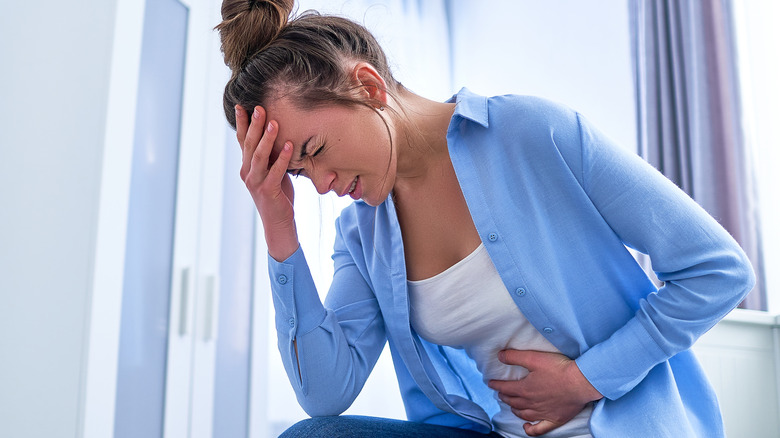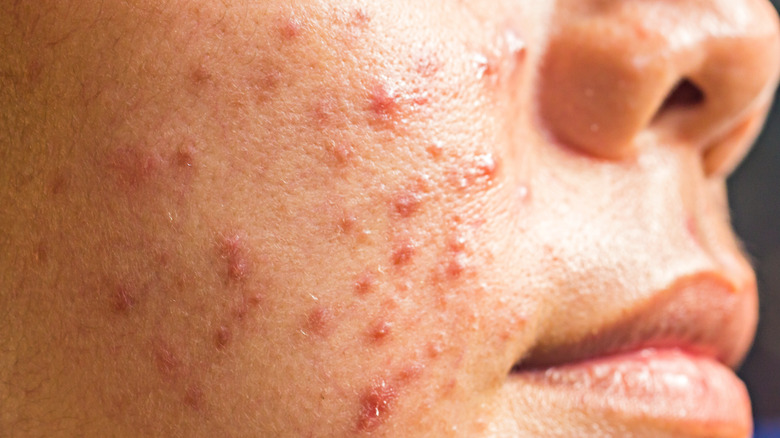Why Endometriosis Could Be The Cause Of Your Skin Flare-Ups
Endometriosis is usually associated with heavy menstrual bleeding and pain, infertility, backaches, and digestive complaints, but it can also take a toll on your skin. This disorder may have hormonal and immunological causes (per the Mayo Clinic), both of which could contribute to acne, eczema, and other skin conditions. Moreover, it may increase your risk of developing psoriasis, a chronic inflammatory disease, according to the experts at MyEndometriosisTeam.
Understanding what happens to your body when you have endometriosis isn't always easy, especially if you're newly diagnosed. Additionally, its symptoms mimic those of other conditions, such as pelvic inflammatory disease or digestive disorders. Some women experience seemingly unrelated symptoms like nausea, fatigue, or painful urination, which makes diagnosis difficult. For example, the National Institute of Child Health and Human Development (NICHD) found a potential link between endometriosis and fibromyalgia, allergies, asthma, and eczema. Therefore, this disease may affect the immune and endocrine systems, causing systemic health issues.
Given these aspects, it's no surprise that endometriosis can wreak havoc on your skin. On the positive side, you may be able to prevent or reduce acne breakouts, eczema flare-ups, and other related problems. But first, let's take a closer look at the connection between endometriosis and these skin issues — and why it matters.
How does endometriosis impact skin health?
According to the NICHD, endometriosis may increase the risk of atopic diseases. These disorders are due to an abnormal response to common allergens and can affect the skin, nose, or eyes (via the U.K. Parliament). Some examples are atopic dermatitis, eczema, rashes, allergic rhinitis, hives, and contact dermatitis. One explanation is that the mast cells in endometriosis lesions produce inflammatory compounds and excess histamine, which may result in allergic reactions, suggests a 2012 study published in the journal Expert Opinion on Therapeutic Targets.
Endometriosis has also been linked to cystic hormonal acne, says dermatologist Scott Paviol. This skin condition is characterized by pus-filled lumps, nodules, and other painful bumps. Luckily, there are a couple of things you can do to quickly reduce the appearance of cystic acne. "Make a dermatology appointment to get a comprehensive plan that will address things such as diet, like dairy intake and processed carbs, lifestyle, and health conditions such as endometriosis, PCOS, or medications," Dr. Paviol told EndoFound.
The relationship between endometriosis and acne goes both ways. According to a 2014 study published in Human Reproduction, teenage girls with severe acne are 20% more likely to develop endometriosis later in life than those with healthier skin. The same goes for psoriasis and psoriatic arthritis (PsA), reports a 2022 study featured in the American Journal of Epidemiology. Women suffering from both psoriasis and psoriatic arthritis are more likely to develop endometriosis, and those with endometriosis are at higher risk for psoriasis with PsA.
Eczema flare-ups and other skin problems require lifestyle changes
Endometriosis is treatable but not entirely curable. Depending on the severity of your condition, you may need surgery, medications, or hormonal treatments. Unfortunately, none of these options are guaranteed to work. For example, about one-third of patients who have laparoscopic surgery will experience recurrent symptoms, according to the Women's. Your doctor may also recommend a hysterectomy for endometriosis, but you may still have pain following the procedure.
As far as skin health goes, there's not much you can do to prevent acne and other issues associated with endo. However, you may be able to minimize their recurrence through lifestyle changes. One option is to cut back on high-histamine foods, especially if you have an atopic disease, such as eczema. A 2011 study published in Annals of Dermatology found that low-histamine diets may improve atopic dermatitis symptoms in as little as five days. With this approach, you'll avoid or eliminate processed meats, mackerel, tuna, spinach, aged cheese, fermented foods, dried fruits, nuts, and legumes.
If you have cystic acne, your doctor may prescribe antibiotic creams or topical products with azelaic acid, retinoids, or benzoyl peroxide. Some patients may also benefit from contraceptive pills or corticosteroid shots, notes the Cleveland Clinic. Apart from that, you must keep your skin clean and avoid comedogenic products. A diet low in sugar and dairy foods may help, too. If your symptoms persist, you may need to see a dermatologist, an endocrinologist, or other specialists with experience in endometriosis care.

